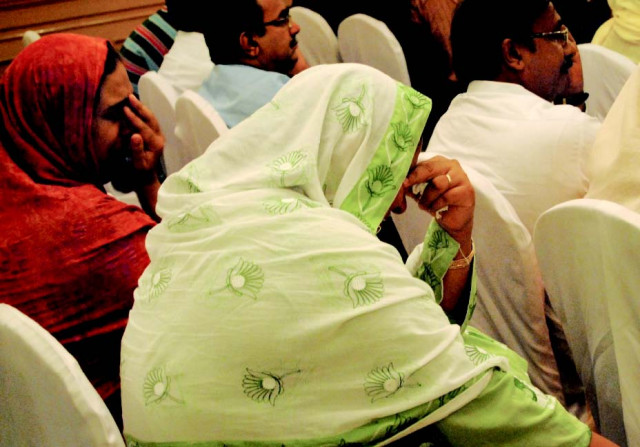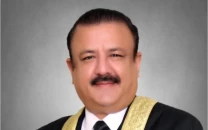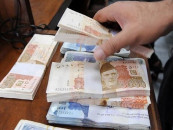Dulce et decorum est pro patria mori - how sweet to die for your country
Ali’s son Owais was one victim of the Margalla hill tragedy. He was also a member of the Youth Parliament Pakistan.

Dulce et decorum est pro patria mori - how sweet to die for your country
“He’s alive, shaheed kabhi martey nahin hain,” says the old man. “Mein fakhr sey ketha hoon ke mein eik shaheed ka baap hoon.” I say with pride that I am a martyr’s father - for martyrs never die.
Ali’s son Owais was one of the victims of the Margalla hill plane crash. He was also a member of the Youth Parliament Pakistan, a group of talented young men and women who wanted to make a change.
On Wednesday, Ali and six other mourning parents met at a condolence tribute organised by the Pakistan Institute of Legislative Development and Transparency. For all those present, these young men and women were still alive as “martyrs” as they had given their lives in the cause of public service and democracy.
Hasan Javed Khan, Syeda Rabab Zehra Naqvi, Prem Chand, Bilal Jamaee, Owais bin Laiq and Syed Arsalan Ahmed were the brightest and the best, not only refered to as shaheed but throughout the ceremony as ‘heeray and phool - phool jo hum sey cheen liye gae they 28 july ko’ in the words of Ahmed Bilal Mehboob, executive director of Pildat.
Looking longingly at the six blown up pictures on the wall behind the stage, former senator Javed Jabbar expressed what only parents can know. “Every parent thinks my child will be an engineer or a doctor or an IT specialist, no one says I’ll make him a politician.” But the Youth Parliament members were exceptions to this rule, people from good families who wanted to serve the people.
Shamas ur Rehman Alvi, a member of YPP’s 2009-2010 batch, had nothing but memories of his friends to console him. “It’s a sad day when you cherish your friendship only when it’s been cut short,” he said. “I remember all the plane trips, the food we shared, the debates we held.”
The academic achievements of the six youth parliamentarians are known. They were headed for the London School of Economics and Cambridge University. They were writers, debaters, social workers. But Shamas offered a different side to them: Bilal Jamaee, I will miss your Urdu poetry, your humour and constant smile. Hassan, the way he could rally people around him for a cause. Rabab for the way she questioned everything and her simple approach to life. Arsalan, how he was never involved in petty politics and his musings on Karachi. Owais’s ability to win hearts and Prem, an asset to his community, a proud Pakistani.
“It was during the regime of Pervez Musharraf,” recalled Zameer Ahmed Malik, a member of the 2008-2009 batch. “I remember in those days, Bilal Jamaee and I spent our time at the Karachi Press Club. He would say, ‘Watch your mouth or you’ll get killed one day’. How was I to know that it would be him who died first, not me?”
As one looked around the room, it became clear that these would-be leaders of tomorrow were from middle class families, a fact not lost on Prem Chand’s relatives who had come from Sanghar. “We are poor, we come from backward areas, but never once did Prem suffer from an inferiorty complex,” they said. “Sometimes I still think that that I’ll go home, drop my bags, knock on his door and we’ll talk like old times,” said one of his friends Rahul.
At one point, Zameer cried out: “Aaj kal corruption ka bazaar garam hai! These kids got though not on bribes, but on merit.”
Prem Chand’s mother Mrs Thakoram’s face was covered but her voice rang out loud and clear: “What does a mother have to say? Can there ever be a son like Prem? One son out of three daughters?”
These words had the effect of breaking the composure of the audience.
Bilal’s father Naseer Ahmed took comfort, however, from the people who had gathered. “The more I see, the more it seems that my son is almost public property,” he said with a flicker of a smile. “My son would tell me, ‘You’re a journalist, why don’t you write, do something?’ But I never did.”
Owais’s elder brother Umer remembered how fondly his brother would call him ‘Ayya’. “As a kid he couldn’t say the word bhaiya,” he explained, and then shaking with emotion and pride, he said, “Four air commodores brought his body back to Karachi. My brother was taken to his funeral wrapped in Pakistan’s flag.”
Rabab’s mother Mrs Murtaza Naqvi saw the tragedy in another light. “This is just another test for us sinners,” she said. But nothing touched Mrs Rafia Taj more than Bilal Jamaee’s gesture right before he departed for Islamabad. “He knew that I loved Nargis key phool and told me that he’d get them from Islamabad for me. It’s not even the season for them! And he said, ‘Don’t worry, I’ll find them for you.’”
Amid the grief ran undercurrents of anger. Jabbar, for example, was shocked at the insensitivity of both the civil aviation authority and the airline company. “You have a mechanised voice as if it was from a call centre informing you of the death, saying, ‘We are sorry’,” he said.
Wazir Ahmed Jagezai pointed out that not many people knew that these young members were going to start a political party - a different kind of party based on knowledge, intention and sincerity.
As Pildat’s Ahmed Bilal Mehboob said towards the end: “It’s not how many years their life consisted, its how much life there was in those years.”
reporting by MEIRYUM ALI
Published in The Express Tribune, August 12th, 2010.


















COMMENTS
Comments are moderated and generally will be posted if they are on-topic and not abusive.
For more information, please see our Comments FAQ